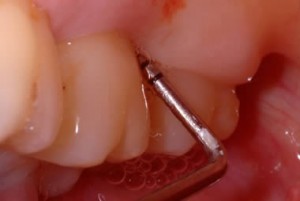Receding Gums And Related Oral Health Issues
Poor gum health can have a number of repercussions. Here’s how to avoid them….
 Most of you are probably quite strict about brushing your teeth and do so both morning and night every day. Of course, there is always room for improvement and we will touch on that a little later.
Most of you are probably quite strict about brushing your teeth and do so both morning and night every day. Of course, there is always room for improvement and we will touch on that a little later.
It is likely that when most of us brush our teeth, we pay more attention to our teeth than to our gums. In fact, you should pay equal attention to both as poor gum health can have a number of consequences that can negatively impact your life.
Having regular check ups at the Foxhall Dental Practice in Ipswich, along with seeing our hygienist on a regular basis is essential and we can offer help and advice to enable you to have healthier gums. Much of the responsibility lies with how you look after them yourself though, and in today’s blog, we will look at some of the consequences of poor gum health and what you can do to keep yours healthy.
Gum problems
Gingivitis and Periodontitis – As regular readers of our blogs will know by now, these are the main stages of gum disease. Gingivitis is the earlier stage and can often be reversed and managed through better home care and a scale and polish by our Ipswich based dental hygienist. Periodontitis is a more advanced form of gum disease that not only affects the gums but also the roots of the teeth and sometimes the surrounding bone as well. Treatment for this is much more invasive and requires the attention of a suitably qualified dentist to attempt to reverse it in order to prevent tooth loss.
Peri-implantitis – This is similar to periodontitis and can affect anyone with a dental implant. The surrounding bone and tissues are affected and this can cause the implant to become loose and potentially fall out. It is especially important to make sure that you clean around a tooth implant well as advised by your dentist.
Receding gums – One problem that is associated with gum disease but perhaps receives less attention than bleeding gums and bad breath is the problem of receding gums. This has a visual effect of making our teeth look longer and tends to happen to some degree as we get older (hence the saying ‘long in the tooth’). It can happen prematurely if we don’t look after our gums though. In addition to this problem, receding gums also expose the root section of the tooth. This is less well protected by enamel and once exposed is more vulnerable to both tooth decay and tooth sensitivity.
Improving your gum health
There are two essential ways in which you can start to improve the health of your gums. Neither takes a great deal of effort but does require consistency.
Improve your home oral care – Even if you brush your teeth twice a day, there is always room for improvement. The following checklist will help:
- Change your toothbrush if the bristles are worn (usually around 3 months)
- Position the bristles when brushing so they reach beneath the gum line
- Pay special attention to the difficult to reach areas
- Spit but don’t rinse after brushing
- Use dental floss if you don’t already. Ask the hygienist to show you how to use it correctly
- Never eat anything after your night time brushing. Only water should be taken
If you do these things diligently, not only are you less likely to suffer from tooth decay, but your gum health should also be protected as well.
See a hygienist – However well we look after our teeth and gums, potentially harmful bacteria always finds a way to collect on our teeth and especially around the gum line. These bacteria, along with minerals from our saliva, will form a hard substance known as tartar or calculus. This creates a rough surface on the tooth which becomes a magnet for further bacteria.
It is impossible to remove tartar with regular home brushing and you will need a scale and polish to be carried out by the hygienist. This is a non invasive treatment which consists of 3 stages.
- Excess tartar is ‘scraped’ away manually with a special tool
- An ultrasonic tool is used to shatter the bulk of the remaining tartar
- A high speed brush is used to clean any remaining tartar. This also has the additional bonus of removing some surface staining too
This is a quick and painless treatment that you should have every six months or so. Some, who are more vulnerable to gum disease, may require this more frequently and we will advise you of this. These appointments are also a great opportunity to discuss your oral health in general and suggestions might be made as to how an improvement in your eating or drinking habits can be beneficial to you.
To take the first step towards better gum health, you will need to make an appointment to see Samantha or Clementine, our friendly dental hygienists. You can make an appointment to see them by calling the Foxhall Dental Practice on 01473 258396.
